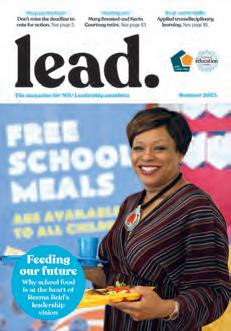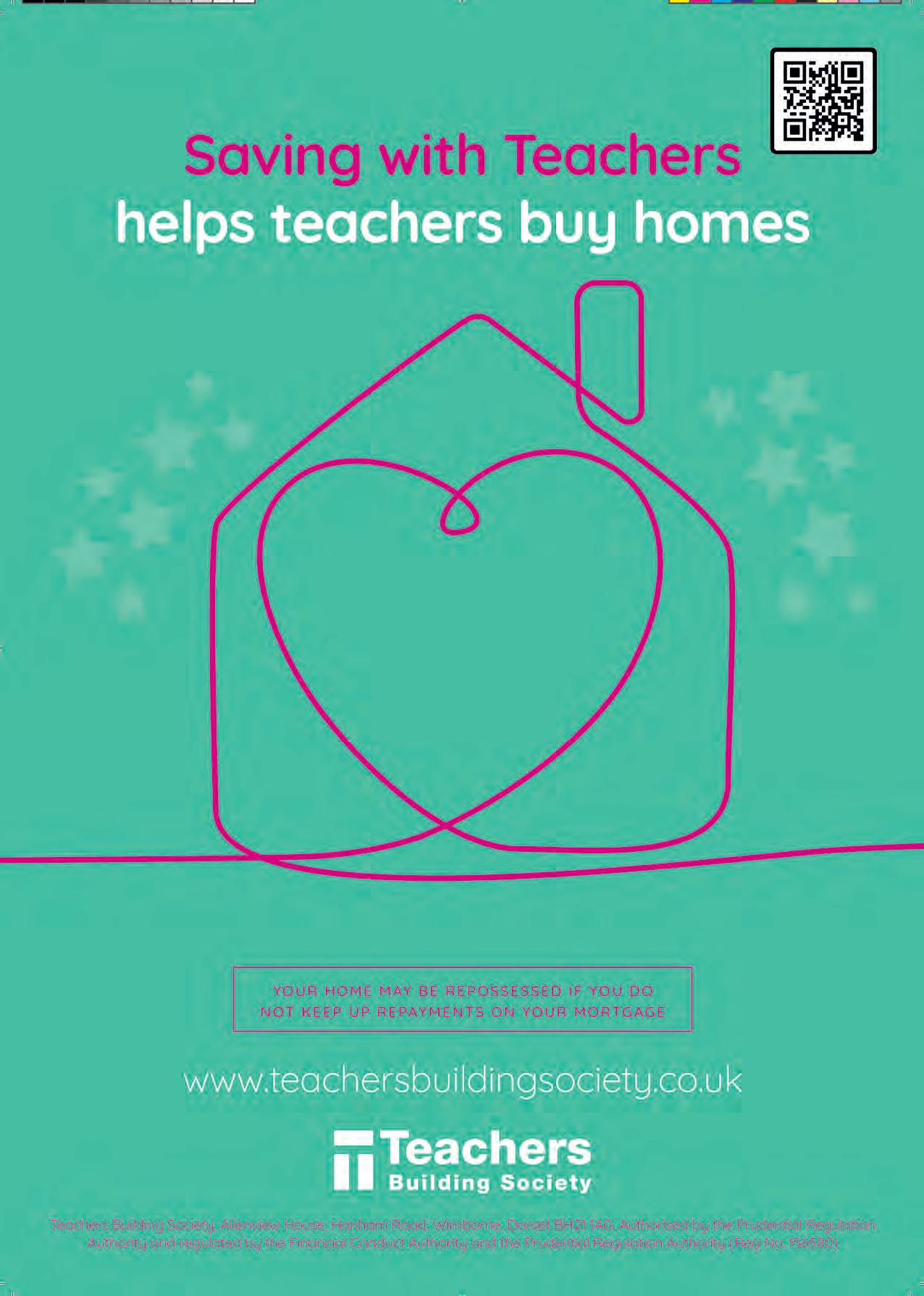Keep up the fight Don’t miss the deadline to vote for action. See page 5.
Bowing out Mary Bousted and Kevin Courtney retire. See page 10.
Real-world skills Applied transdisciplinary learning. See page 16.



Feeding our future
Why school food is at the heart of Reema Reid’s leadership vision
 The magazine for NEU Leadership members
Summer 2023
The magazine for NEU Leadership members
Summer 2023

Lead.
Summer 2023
Reema Reid at her school, Hollydale Primary, where all children are entitled to a free school meal.
Photos: Rehan Jamil
NEU president:

Louise Atkinson
NEU joint general secretaries: Mary Bousted & Kevin Courtney

Editor: Sally Gillen
Editorial assistant: Sarah Thompson
neu.org.uk



WE are on the brink of a historic moment. Three head teacher unions – the NEU, NAHT and ASCL – are all balloting for strike action over the Government’s failure to provide an above-inflation, fully funded pay offer. If we all return YES votes, the industrial action in the autumn will impact almost every school in England.
NEU Leadership members have helped pave the way for what will be an unprecedented display of professional unity and strength.
You were the first to show your courage and commitment to getting a fair deal for your staff and schools by joining picket lines and demonstrations across the country. Now others will join you.

As ASCL general secretary Geoff Barton said of the union’s ballot – the first in its 150year history – there really is “no option”.
The lesser-spotted Education Secretary Gillian Keegan will be forced to re-open talks. Mary and I will no longer be part of them. At the end of August, we are retiring. But our successor Daniel Kebede, a relentless campaigner, will take up your fight.

And we will be with you in spirit, celebrating when you win what you deserve.
In its first five years, the NEU has come a long way. Starting out wasn’t easy. On page 10, Mary and I share with you some of our early leadership challenges, not least how we managed our own doubts and fears.
As leaders, you will recognise some of what we faced. But we, like you, kept going.
Thank you for all you have done and will continue to do for your staff and students. If you haven’t already, please do vote in our re-ballot, which closes on 28 July
Kevin Courtney Joint general secretary National Education Union
Features
Senior editor: Lizzie Hufton
t: 01225 337777
e: lizzie.hufton@james pembrokemedia.co.uk
Design manager: Christina Richmond
To advertise contact: t: 020 7880 7614
e: lead-magazine@redactive. co.uk

Ad artwork coordinator: Rachel Young rachel.young@redactive.co.uk Except
Regulars
4 Update The link between poverty and GSCE grades; and the vote for autumn strikes
22 Final word Mary Bousted reflects on her time as joint general secretary
9 Interview Incoming NEU national president Emma Rose
10 Interview
Joint general secretaries Mary Bousted and Kevin
16
18
Courtney describe the highs and lows of their joint leadership
How I… Introducing applied transdisciplinary learning
Masterclass How to implement a school-wide focus on good nutrition
Published on behalf of NEU by James Pembroke Media, 90
Street,
jamespembrokemedia.co.uk
Walcot
Bath BA1 5BG
where the NEU has formally
agreements with companies as part of its services to members, inclusion of
advertisement in Lead does not imply any form of recommendation. While every e ort is made to ensure the reliability of advertisers, the NEU cannot accept any liability for the quality of goods or services o ered. Lead is printed by Walstead. Welcome Contents lead. The magazine for NEU Leadership members 3 4 9 10
negotiated
an
facebook.com/ nationaleducationunion twitter.com/NEUnion
Pupils using food banks get lower GCSE grades, Covid study shows
AN England-wide study looking at the impact of the Covid-19 pandemic on educational inequality, wellbeing and social mobility has found a link between poverty, mental health and attainment of GSCEs.
Findings from the Covid social mobility opportunities (COSMO) study, which is tracking the progress of 13,000 year 11 students from the academic year 2020/21 at more than 500 schools, were published in May. The research, led jointly by the UCL Centre for Education Policy and Equalising Opportunities (CEPEO), the UCL Centre for Longitudinal Studies, and education charity The Sutton Trust, has found food poverty and hunger are linked with lower GCSE attainment.
Pupils in families using food banks received lower GCSE grades – half a grade
Findings from the COSMO research
• 82 per cent of parents and more than half (53 per cent) of young people in families struggling financially report poor mental health
• Food bank use and long-term poverty is associated with lower GCSE attainment
• O ne in ten young people are living in households classed as food insecure
per subject on average – than they would be expected to, even taking into account previous grades and other aspects of their household finances.
Food poverty hit many families during the pandemic. The majority (57 per cent) of households in the study where young people went hungry were not eligible for free school meals (FSM), and 36 per cent of young people using food banks were not FSM eligible either. The report says this raises questions of whether eligibility is set at the right level, especially as food costs have risen.
NEU joint general secretary Mary Bousted commented: “This research confirms what teachers have witnessed over the last few years: that rising family poverty levels have had a devastating impact on children’s education. No child should go hungry throughout the day and the fact that so many children accessing food banks are not eligible for free school meals is a harrowing
indictment of restrictive eligibility criteria. Fifty-eight per cent of our members told us they or their schools are providing additional food for children throughout the day.
“The best way to ensure that all children access the education they deserve is to offer free school meals to all children, starting with those in primary school. This would reduce stigma and improve attainment for the most disadvantaged, ensuring no child is left behind.”
She added that the Government needed to urgently address mental health support, with many schools struggling to access child and adolescent mental heath services.
See Masterclass, page 18, and sign up to the NEU’s campaign for free meals for all: #freeschoolmealsforall youtube.com/ watch?v=HQ0EvWhAQSU neu.org.uk/campaigns/child-poverty
Report finds SATs have a host of negative effects on primaries
SATs have negative impacts on pupil wellbeing, teacher autonomy, and the breadth of the primary curriculum, according to a report by campaign group More Than A Score and thinktank the Education Policy Institute.

The report was commissioned to look at what we mean by primary school standards and whether Government tests are a good indication of these.
The report says: “Current year 6 SATs test a child’s ability in reading, writing and maths, measuring technical abilities, rather than the more complex skills of creativity, teamwork and critical thinking. Given that SATs data is used to measure school performance and set standards, participants shared concerns that this narrow breadth of assessment can lead to ‘teaching to the test’ and
narrowing of the curriculum. The key question arose of whether our standards setting system is ‘the tail that wags the dog’ and drives what is taught in schools, rather than the other way around.”
epi.org.uk/publications-andresearch/re-defining-standards-inenglish-primary-education neu.org.uk/assessment/primaryand-early-years-assessment
lead. The magazine for NEU Leadership members 4 Update
Voting deadline approaches in re-ballot for autumn strikes
THERE is still time to vote in the union’s ballot to continue industrial action over the pay and funding dispute this autumn. The ballot closes on 28 July
Many thousands of members have voted since it opened in May, after rejecting Education Secretary Gillian Keegan’s insulting and unfunded 4.5 per cent offer for most teachers.

Head teacher and Wirral NEU assistant secretary Michael Farrelly said: “It has never been more important to vote for this action. Gillian Keegan is just not listening. If we don’t keep up the fight, then what will have been the point in taking action in the first place? As the dispute has gone on, more and more schools in my area have had pickets, many for the first time. We must keep going.”
The union is re-balloting because the mandate for the first series of strikes ended on 13 July.
As Lead went to press, Keegan had failed to reopen pay talks despite receiving the School Teachers’ Review Body report, rumoured to recommend a 6.5 per cent rise for staff. NEU joint general secretaries Mary Bousted and Kevin Courtney said the delay was “hugely disrespectful” to head teachers who could not plan properly for next year.
Head teacher unions the NAHT and ASCL are also balloting members on strike action until 31 July. It is the first time in its 150year history that ASCL has balloted for industrial action.
ASCL general secretary Geoff Barton said that the union had been left with no option.
He said: “This squeeze on school resources is effectively without precedent in post-war UK history.”
Mary and Kevin said: “Our re-ballot allows the NEU to co-ordinate action with other teacher unions in the autumn term if Government does not provide a settlement to the dispute. It is never too late for the Education Secretary to come to the negotiating table and make an improved offer.”
AS Lead went to press, the union’s national executive announced national strikes on 5 and 7 July.
NEU joint general secretaries Mary Bousted and Kevin Courtney said: “No-one wants to strike but faced with an Education Secretary who has no interest in settling this dispute, teachers are left with no option.”
Why you should vote again WE have come too far to give up our fight for a fully funded, inflation-proofed pay rise.
Three reasons to vote YES:
1. Your determination has put this Government under huge pressure to act in the interests of schools and teachers. We have not come this far to give up the fight for a fully funded, inflation-proofed pay rise. You deserve to be paid properly for the vital work that you do.
2. Pa rents and children rely on us to demand that schools are funded to provide an education system that enables all pupils to fulfil their potential, in schools which are staffed with teachers qualified in the subjects they are teaching.
3. T he profession stands united. Head teacher unions ASCL and the NAHT are balloting their members for industrial action, as is the NASUWT.
Five things to do now:
1. CHECK your post
2. OPEN the envelope from Civica
3. VOTE for strike action on pay and funding
4. POST the envelope
5. CONFIRM that you have voted
By law, the formal re-ballot needs to be postal. The ballot closes on 28 July.

lead. The magazine for NEU Leadership members 5 Update
Wirral NEU assistant secretary and head teacher Michael Farrelly is among those voting for fresh action
Inquiry into Ofsted must look at one-word judgements, says union
MPs carrying out an inquiry into Ofsted inspections must look into the impact of one-word judgements, the union has said.
The inquiry by the Education Select Committee was announced last month. It follows the suicide of primary head teacher and NEU Leadership member Ruth Perry.
Committee chair Robin Walker said there had been a “notable groundswell of criticism” of Ofsted.
MPs will consider how inspections impact workload and the wellbeing of staff and pupils, and whether Ofsted’s reports help schools to improve.
NEU joint general secretary Mary Bousted said it was “paramount” gradings were investigated by the committee.
“The NEU welcomes this inquiry into Ofsted,” she added. “There is overwhelming consensus in the education profession that
inspections need to change.”
Just days before the inquiry was announced, Ofsted said it planned to reform some of its processes – including the complaints procedure – but insisted one-word judgements would stay.
But Mary said Ofsted had not comprehended the scale of change needed to address the “deep concerns” of leaders and teachers, adding: “More extensive and fundamental changes are needed to limit the damage done by Ofsted to leader and teacher wellbeing.”
She went on to say that she hoped the inquiry would hear from a wide range of education professionals to build the case for a different approach.
“Looking at the impact of the regime on school leaders, teachers and pupils, including the impact of single-
SATs results not a good indicator of ‘high standards’ in primary education

WHAT do we mean by ‘high standards’ in primary school? The union asked teachers for their thoughts, and they told us it’s time to redefine standards and their relationship with primary tests.
In our survey, 92.4 per cent of teachers disagreed that year 6 SATs were the most accurate indicator of whether pupils have received a high standard of primary education, while 90.1 per cent agreed a child may still have the standard of literacy and numeracy needed for secondary school, even if they did not meet the ‘expected standard’ in year 6 SATs.
And 94.68 per cent of teachers agreed it is unfair that Government uses year 6 SATs results as shorthand for primary school standards.
When asked what shows a good standard of primary education, teachers selected:
• pupils developing skills for life, such
word judgements, is paramount, as is a full assessment of whether or not Ofsted is having any meaningful impact on supporting improvement. We look forward to engaging with the inquiry and sharing the views and experiences of our members.”
The NEU is campaigning for Ofsted to be replaced by a system which is effective, fair and supportive. In April, NEU deputy general secretary Niamh Sweeney and a group of members handed a petition to the Department for Education calling for Ofsted to be replaced.
It had more than 50,000 signatures. The NEU-sponsored Beyond Ofsted commission, launched earlier this year, is investigating alternatives to the current system. It is gathering evidence, including from educators on their experiences, and it will publish a report later this year.
as communication, leadership and resilience
• a broad, rich curriculum
• children engaged with learning.
Primary teachers told us about the problems with formal assessment in primary schools. Here’s what they said:
“You get the sense that children dread getting to year 6. There is an incredible amount of pressure put on them.”
“It’s not just the tests, it’s the highstakes culture we have in schools. It’s league tables and the fact that schools are judged on these tests.”
“I’ve been teaching a multilingual group of children phonics. I have to explain to them that for the test you have to read a word that isn’t a word!”
“Every time we take a child out of an art lesson for a SATs intervention, or staff a booster session during the holidays, we legitimise this system.”
“If the children seem happy, contented, confident, build good friendships… that is the measure for me.”
Watch and share our new film on Instagram: instagram.com/p/CsItBhpLLZ5/?hl=en Facebook: facebook.com/ nationaleducationunion/ videos/977342030105575/
lead. The magazine for NEU Leadership members 6 Update
NEU tribunal win for senior examiners
THE union has won an employment tribunal brought against Pearson Education Limited that means its senior examiners must now be treated as ‘workers’ rather than as self-employed.
Royal Institution announces programme of
summer events
FIND out more about what the Royal Institution (Ri) has on offer for your students this summer. The independent charity, which recognises that the seeds of a lifelong love of science are sown in childhood, has a partnership with the NEU.

During the long summer holidays, the Ri runs popular workshops at its historic home in central London. Fun and educational, Ri holiday workshops are hands-on, age-appropriate sessions for young people aged 7-18, bringing every area of science to life, including maths, computing and engineering. New
workshops for 2023 include ‘The great recycling challenge’ and ‘Mathemagics’. And if you’re not within travelling distance of London, or to keep younger children occupied during any of those dreaded rainy days, take a look at the Ri’s fun do-at-home experiments; while its UK-wide network of masterclasses are free for students who would benefit from an in-depth exploration of science, but who might not be able to afford similar paid-for opportunities.
Go to rigb.org/learning
Head teachers leaving before retirement hits 12-year high
MORE than 2,300 head teachers in England left the profession before retirement in 2021/22 – the highest number since the Conservatives came to power in 2010.
Figures from the Department for Education’s school workforce census, published in June, also show that 44,000 classroom teachers quit within the same time period.
NEU joint general secretary Kevin Courtney said: “This data shows the consequences of real-terms cuts to teachers’ pay and unmanageable teacher workload. It is imperative that Government increases and fully funds pay and reduces teacher workload.”
On 20 June, NEU joint general secretary Mary Bousted gave evidence to the Education Select Committee, which is carrying out an inquiry into recruitment, retention and training. Mary told MPs the numbers of teachers leaving was “alarming”.
Workload, poor pay, and the pressures of coping with the rise in child poverty, and growing numbers of children with mental illness – with little or no support from overstretched outside agencies –was driving educators out, she said.
See final word, page 22
The groundbreaking test case involved a member who, along with many others, lost her income when exams were cancelled during the pandemic.
Pearson has now been forced to admit the member had ‘worker’ rather than self-employed status and is entitled to, among other things, holiday pay.
The member has received back-pay for holidays.
Senior examiners began contacting the union when exams were cancelled during the pandemic. Many rely on the work as their only income and had no way to pay their bills.
The exam board refused to furlough them, claiming they were self-employed, while HMRC said they were employed and therefore not entitled to benefit from the self-employed income support scheme.
NEU joint general secretary Mary Bousted said: “What this case has highlighted is that across the country the highly skilled and experienced professionals who are responsible for writing exam papers, ensuring they are marked fairly and consistently, and keeping the entire exam system going are all on precarious piecemeal contracts with no job security or employment rights afforded them.
“The NEU is hopeful that this test case is just the beginning of securing improved employment rights and security for all those examiners who are integral to the smooth running of the UK’s exam system.”
lead. The magazine for NEU Leadership members 7 Update

‘We fought and we won on every single thing’
WHEN a new head teacher joined her last school, Emma Rose introduced herself as the union rep. “His first words were ‘unions are anathema to me,’” recalls Emma, who will become the NEU national president in September. “He said ‘the thought of you all sitting in a room, moaning about things, I find really distasteful. I hate it.’”
She soon put him straight.
“I said you’ve got it completely wrong. If people are coming in and complaining, it is because the problems already exist. If your staff are unhappy, surely you want to know about that, and you want to put it right?”
Apparently, he didn’t, and a series of disputes followed.
The first involved an observations policy, where what had been informal, ten-minute learning walks became observations, with some staff finding notes on their teaching feeding into performance management meetings. Next was an attempt to force GCSE teachers to use their gained time to cover. Then came the announcement of a mock Ofsted. Lastly, there was a new performance management target for 75 per cent of pupils to achieve grade C or above.
“We fought and we won on every single thing,” says Emma. Inevitably, of course, each dispute eroded a little more the trust between the leader and staff.
Now at a different school, Emma, a modern foreign languages teacher who is also a district secretary in Warwickshire, sometimes finds herself repeating the advice given to her previous head – which he ignored to his cost – to other heads.
Some see that unions improve employee relations, others don’t, she shrugs. Although the growing recruitment and retention crisis means leaders can ill afford to overlook the needs and wishes of staff.
“I don’t know a head who isn’t worried about recruitment,” says Emma. “That is why our pay and funding campaign is so vital. Yes, members need and deserve more pay, and as professionals we shouldn’t be shy to say we deserve it, but members also see the real injustice in school funding.”
She adds that the Government’s unfunded pay offer has left leaders “tearing their hair out”. The tone-deaf response of the Government to the dire state of underfunded schools, and the struggles of increasingly poorly paid staff, makes the political campaigning, alongside strike action, so important, she argues. “Parents probably aren’t aware of all the things happening in schools – that leaders can’t recruit teachers;
that so many school buildings are dangerous; that schools just don’t have the money for repairs; that children with special educational needs and disabilities aren’t able to access the support they need.”
Leaders are having to “pick up the pieces of a really dysfunctional society,” she adds. “It’s not just about educating children, gluesticks, textbooks and repairs in schools. It is also about school leaders carrying the load of crumbling public services.”
Emma, who has been on the picket line on every strike day – apart from one, when she had Covid – notes proudly the growing momentum of the dispute, with more schools in her county now prepared to have picket lines.

As president she intends to spread the message far and wide about the state of schools, with the same passion as she pursues other issues close to her heart: curriculum, pedagogy and assessment.
The fear of Ofsted is, unfortunately, encouraging some schools to become overly prescriptive in lesson planning and delivery, stripping teachers of their professional autonomy and damaging trust between leaders and staff, she believes.
She is a member of the Beyond Ofsted commission, brought together by the union to look into alternatives to the current inspection system, and she is also part of a secondary assessment working party.
“I’m really interested in looking at a system that isn’t just about the academic achievement you can put on a spreadsheet,” she says. “Our assessment system at the moment has failure built into it.”
lead. The magazine for NEU Leadership members 9 Interview
Incoming NEU national president Emma Rose tells Sally Gillen why members must keep up the fight for fair funding and a pay deal.
Emma addressing the NEU annual conference in Harrogate in April
Photos: Ben Broomfield
‘Get the big calls right and you’ll be OK’
IT was dubbed a super-union by the media, but for many in the trade union movement the National Education Union – created in 2017 when the Association of Teachers and Lecturers (ATL) and the NUT amalgamated –was doomed.
“Other general secretaries who had seen mergers said it wouldn’t work and it would take at least ten years before the amalgamated union would start to function properly because there can be lots of infighting and jealousy between staff,” recalls Kevin Courtney, NEU joint general secretary and former general secretary of the NUT.
Six months after the two unions became one, those dire predictions seemed to be coming true. There was a lot of staff angst, with both general secretaries dealing with complaints from their respective staff, who were struggling to work out who would do what, says Mary Bousted, who had been general secretary of ATL for 14 years. “No amalgamation is easy, particularly for staff, and it was a really difficult time. ATL staff worried the organisation would be swallowed up by the much bigger NUT, which regarded the smaller union as Johnny-come-latelys,” she explains.
The two unions had decided to ballot their members on a merger as a response to the growing threat to education posed by former Education Secretary Michael Gove’s fast expansion of academisation. Kevin and Mary had already worked
together successfully in 2011 during the pensions dispute.
But in those early months postamalgamation, it wasn’t just the staff who were struggling to adjust. Mary and Kevin admit they, too, found the rapid change tricky to manage.
Turning point
“I think as general secretaries, we were both feeling a bit of grief about what we had given up, even though we knew amalgamating was the right thing to do. We had both lost a bit of control because we were now sharing it. At that time, Kevin was still working mainly in the NUT office, I was still at ATL’s London office. We were still finding out how it would all work, and we didn’t know each other that well,” she adds.
It was at an awayday that things came to a head.
“It was a cold winter’s day and, without a great deal of enthusiasm, we were going through some aims. I had just
knocked over half a pot of coffee – so things weren’t going well – and I just said ‘I feel so bloody miserable’. Kevin looked a bit shocked and said ‘well, I feel so miserable, too,’” remembers Mary. “That made things a lot easier, just having an honest conversation. It was quite cathartic. We were able to talk about why we felt as we did and then we were able to get on with what we were doing.”
Kevin also looks back on the day as a bit of a turning point. “The big issue for me had been that sense of buyer’s remorse. People will be very familiar with that after a big purchase. There was a sense of loss of the union I had been a member of for so many years, and the sense of giving up my position and authority as its general secretary, and a free-floating, unformed concern for colleagues and the union’s traditions.
“At the same time, Mary and mine’s relationship was new and untested. Acknowledging those concerns with one another, and agreeing to work the issues through together, was a big step forward.”
Not that there was an overnight transformation. The frank conversation helped their relationship grow, but things remained tough for some time. Mary admits to doing something many leaders will recognise – going out and looking confident and purposeful when often she felt neither.
“As a leader, you do the best you can. You listen to people, and you take advice, but in the end it’s your job to make a decision. If you get it right 75 per cent of the time,
lead. The magazine for NEU Leadership members 10 Interview
As they bow out, NEU’s joint general secretaries Mary Bousted and Kevin Courtney have a candid chat with Emily Jenkins about the challenges of leading Europe’s largest education union.
“Other general secretaries who had seen mergers said it wouldn’t work.”
and you get the big calls right, you’ll be OK,” she says. “You have to be resilient. You have to work very hard and cope with being tired, but the reward is that your job is very interesting. I’ve had the opportunity to do a job I feel is morally and ethically the right thing. Not everyone gets the chance to work in a job where you’re doing a good thing.”
Signs of success
Looking back on the early days of the NEU, Mary says: “I’d say we had a bit of a crisis of confidence around whether we had done the right thing. It didn’t quite feel we had at the time, but clearly it was the right thing.”
The NEU’s success in its first five years is proof of that. Under Kevin and Mary’s leadership, the union has gone from strength to strength.

Their professional respect for one another has grown, and with it a firm friendship.
“It’s important you like someone,” says Mary, while Kevin cites their personal chemistry as a key ingredient in the success of their joint leadership, along with mutual trust. They share the same vision for education. They are also each committed to unions being organising unions, says Kevin, with a strong rep base in schools and colleges.
Each brings different, though complementary, skills to the partnership. Kevin is a great campaigner who has taught her how to be relentless, says Mary. For his part, Kevin admires Mary’s academic knowledge of education and writing – she is a former English
teacher – and her intellectual demolition of Ofsted.
This mix of friendship, professional respect and different skills has helped them build the NEU, now the third largest union in the Trades Union Congress.
The first sign of the union as a campaigning force, with the power to influence, came early. The School Cuts website, allowing users to see how much funding individual schools had lost, became a powerful campaigning tool, helping to make school funding a key issue in the 2017 General Election. Research by pollsters Survation revealed that around 750,000 voters had changed their mind about who to vote for because of the Government’s school funding policy.
lead. The magazine for NEU Leadership members 11 Interview
Kevin and Mary knew there would be hard work ahead following the merger. (Photo: Jess Hurd)
In 2019, then Prime Minister Boris Johnson increased school funding by £2.6 billion for 2020/21.
Tough times
In March 2020, Mary and Kevin’s still relatively new partnership was put to the test when they found themselves leading the union’s then 460,000 members (there are now more 500,000) through the worst public health crisis in a hundred years.


The Covid-19 pandemic coincided, disastrously, with Gavin Williamson’s stint as Education Secretary. While he and the rest of Government reacted too slowly, and always inadequately, to the mounting health crisis and growing numbers of Covid deaths, Kevin and Mary acted swiftly and
decisively to advise and protect members. This put the pair in the firing line, and they were often attacked in the media, which implied the union was misleading members and denying children their education. “The establishment was down on our heads, and we had to support each other through that,” says Mary.
Kevin nods, adding: “Williamson started calling us the ‘no education union’, saying we were closing schools and depriving children of education. If he had taken our advice, schools would have been closed for far less time.”
He credits NEU staff for the part they played in the union’s response to the pandemic, from the really good advice they provided on health and safety to building the best communication techniques in the trade union sector.
While he and Mary have some skills as leaders, he says, they are always drawing on the knowledge of staff.
The communications strategy, using the latest technology, allowed them to get union messages, guidance and advice out to hundreds of thousands of members in workplaces, and then later, their homes.
Making big calls
On 3 January 2021, more than 400,000 people joined a Zoom call, where Mary
and Kevin advised members, who were being expected to return to schools and colleges, they had the right to use Section 44 of the Employment Rights Act 1996 to refuse to attend their workplace if they believed it was unsafe.
Mary says: “I didn’t sleep for two nights before the call, but by the end of the day thousands of primary teachers had written a Section 44 letter. I was scared at that point because we were going up against the force of the state – not that being scared stopped us. It made us more determined. But that doesn’t come without personal cost. You think ‘is my phone being hacked?’”
The following day Boris Johnson U-turned and admitted schools were unsafe, partially closing them again. The union gained 20,000 members within the month,
lead. The magazine for NEU Leadership members 12 Interview
“I honestly think the NEU saved so many lives... not just teachers, but parents and grandparents.”
Leading by example at the 2021 NEU conference. (Photo: Kois Miah)
Kevin and Mary supporting members on strike over funding and pay
and 100,000 new Facebook followers, giving it the biggest social media presence of any union in the UK. “I honestly think the NEU saved so many lives over that time. Not just teachers, but parents and grandparents,” says Kevin.

New members joined in their thousands and rep numbers shot up. The union’s actions during this period were a masterclass in organising and activism, during which it built a solid base for the pay and funding strike ballot at the start of this year. The NEU was the only education union able to get the Yes vote for strike action back in February, and the success of our industrial action throughout this year, which has won strong public support, has paved the way for other education unions to ballot their members for action in the
autumn if Education Secretary Gillian Keegan fails to improve the pay offer.
“We are a really effective union. We are able to mobilise quickly. We have a strong activist base. We are able to lead the intellectual argument and we are able to organise quickly to be effective industrially. And I am very proud of it,” says Mary passionately.
Kevin agrees. It’s unlikely the dispute will be resolved by the time he and Mary depart in August, but to have met the strike thresholds alone – and taken action – is in itself a huge achievement. “It feels good to be leaving on a high,” he smiles.
As incoming general secretary Daniel Kebede admitted at this year’s annual conference, Mary and Kevin will be a tough act to follow.
lead. The magazine for NEU Leadership members 13 Interview
“We are a really effective union. We are able to mobilise quickly. We have a strong activist base. And I am very proud of it.”
The joint general secretaries have been vocal critics of Ofsted. In 2022, they delivered giant ‘unhappy’ birthday cards filled with messages from members calling for Ofsted to be replaced. (Photo: Carmen Valino)


Power skills for the 21st century
AMONG educators there is a growing concern that the intensive focus on exams as a way of assessing learning is producing pupils who leave secondary education without important life skills.
It is a common complaint from employers. Many are bewildered by the number of young people who arrive in the workplace unable to communicate to an acceptable level, for example.
The NEU-sponsored commission on secondary assessment, published in 2022, reached the same conclusion. It warned against the dangers of relying solely on exams for a host of reasons that included denying learners the opportunity to develop as critical thinkers.
In 2019, the Aspirations Academies Trust in west London introduced No Limits: a curriculum for success in the world today and in the future. Its aim was to give pupils an education for the 21st century.
Alongside single subjects, pupils in years 7 and 8 undertake six lessons a week in applied transdisciplinary learning (ATL). It is project-based, with students working on six interdisciplinary assignments across the academic year. Assignments are mapped against the national curriculum subjects.
History teacher Prerna Patel is the trust’s ATL lead. She says it is designed to teach children ‘power skills,’ among them communication, collaboration, critical thinking, complex problemsolving and initiative.

“We teach pupils power skills because there is a real need to prepare them for the world beyond school,” explains Prerna. “We want them to be able to apply their knowledge to real-life situations. Our world
is changing very quickly, and research shows that young people will have multiple careers in the future so it’s really important we are giving students skills that are transferable.
“We are moving away from teaching to tests and are implementing a multimodal approach to assessment,” she says. “There is a place for examination, and working under pressure, but at the moment in the education system it is the only way children are assessed.”
She adds that ATL allows students to demonstrate their skills in a variety of ways. For example, during an assessment that involved adapting Romeo and Juliet to the Roman era, pupils demonstrated their learning through a performance of adapted scenes.
“Our pupils with special educational needs and disabilities really come out of their shells in ATL lessons because there are different ways they can present their learning beyond writing or a test situation,” Prerna explains. “They are encouraged to understand what working under pressure means because a key part of the project is meeting deadlines.”
Peer assessment, with pupils being coached to give and receive feedback, means they become competent in this critical skill from year 7.
“This is a huge aspect of communication and something they can take on into future employment. There isn’t one job where you don’t need to be able to handle feedback.”
lead. The magazine for NEU Leadership members 16 How I…
Prerna Patel discusses a way of assessing learning that’s been introduced at her trust to prepare pupils for life beyond school.
“We teach pupils power skills because there is a real need to prepare them for the world beyond school.”
Prerna Patel says exams aren’t the only way to assess learning
Each project ends with an exhibition, presentation or performance to an audience of parents, peers, leaders from industry or those running local businesses, where children share their learning.
By the end of year 7, the impact of ATL on students is clear. They have developed the confidence to present and explain their work. A local MP visited, as part of a project on democracy, and pupils presented to him, adds Prerna. The children also engage with this learning because it gives them autonomy.
Teachers aim to embed these power skills into the assignments they set. One of the challenges of introducing ATL has been to develop teachers’ understanding
of project-based learning.
“It involves a change of mindset for staff. Secondary teachers tend to hold onto their subjects, so the challenge for us is to get across to them that they are really good teachers and they just need to broaden their practice to encompass other disciplines,” says Prerna.

Importantly, the ATL lessons and projects are planned by teachers in teams, to ensure there is subject expertise within each.
Professional development on ATL is delivered annually in July.
“We are able to develop some really creative projects that are relevant to the world we live in, and we are trying to develop the problem-solvers of the future,” says Prerna. “The projects also give pupils time to reflect. A lot of our curriculum is packed with content, but with ATL children are able to think about what they have learned, how it has made them feel and whether they have been successful. We are trying to replicate as much of the world in our classrooms as we can.”
lead. The magazine for NEU Leadership members 17 How I…
Students can demonstrate their ATL learning in new ways, including presentation
“SEND pupils really come out of their shells in ATL lessons.”
Food for thought
Every child is offered a free school meal at Reema Reid’s school and children can ask for a snack at any time. Here she explains why food is at the heart of her leadership vision.
Photos: Rehan Jamil

lead. The magazine for NEU Leadership members 18
At her south London school, the day begins for 50 of its 160 pupils with a free healthy breakfast (see box, right), funded by the Greggs Foundation, which also donates 20 loaves of wholemeal bread a week. Reema works with School Food Matters to plan healthy breakfasts.
The charity exists to teach children
about food and to improve children’s access to healthy, sustainable food during their time at school. At break time, children are given fruit as a healthy snack. Lunch is always hot and freshly cooked. Reema works with school catering company Chartwells and Hollydale’s in-house cook on the menus to check meals are balanced and nutritious.
Her attention to detail could be described as forensic.
It is influenced, she freely admits, by her background.
Food at Hollydale
• Free breakfast club, funded by the Greggs Foundation – wholemeal toast, yoghurt, fruit, porridge and a cooked breakfast, including chicken sausages, once a week. greggsfoundation.org.uk
• Fruit at breaktime
• Cooked lunch – with an emphasis on diversity, with themed days such Caribbean day, Italian day and so on.
• Children can ask for a snack at any time.
• Two food banks a week at 3pm staffed by parents, one provided by the Phoenix Trust, the other by City Harvest. They are for any family in need, rather than those deemed vulnerable, because it is recognised many are living just above the poverty line. Hollydale operates an “equality of provision for all” policy.
• Children sell fruit and vegetables they have grown themselves at London’s Borough Market once a year, as part of an initiative run by charity School Food Matters. schoolfoodmatters.org
• Dr Chef initiative: a professional chef comes in to Hollydale and works with the children for three or four sessions, introducing them to new vegetables and doing tasting sessions.
• Initiatives such as Fizz-Free February have been introduced at the school.

• Posters with health messages about food are displayed in the dining hall.
• Children drink water only and bring in their own water bottle.
• In the holidays, the school opens four days a week and has Department for Education funding of £22 per child, per day, to offer a Holiday Activities Food Programme. Between 40 and 50 children attend.
lead. The magazine for NEU Leadership members 19 Masterclass
“FROM the moment children come into my school, there is a real focus on what they eat,” says Reema Reid, head teacher of Hollydale Primary.
When she became a single parent (her four children are now grown up), Reema says she knew what it was to be short of money, and the food at school was very important, being her children’s main meal of the day. She had also worked as a meal supervisor, or dinner lady, many years before training as a teacher in 1997. “Turkey Twizzlers were part of my era,” she remembers. “There was no focus then on nutritional value or the impact of nutritious food on attainment.”
Now, of course, there is a stack of research showing the links between nutritious food, concentration, cognitive skills and academic performance.
At Hollydale, which Reema has led for a decade, all children have a head start on getting the food they need to make the most of their education.
The school is in the London borough of Southwark, where every primary pupil is given a free school meal. “I am very lucky,” Reema agrees. The universal offer means those children whose families are just above the poverty line, and would not qualify for a free school lunch ordinarily, are given a nutritious meal.
All but eight of her pupils take up the offer. From September, all primary pupils in the capital will be entitled to a free school meal as part of a year-long initiative announced by London Mayor Sadiq Khan.
The NEU is calling for universal free school meals for primary age children (see box, opposite page), as part of our child poverty campaign, No Child Left Behind.
Reema’s level of commitment to food at her school, however, goes beyond feeding disadvantaged children, she says, and has a
broader focus on food education for pupils and their parents.
Finding support
Working with a range of organisations and charities, Reema is able to draw more funds into Hollydale to pay for extra food, in addition to what is council-funded, and she also has links with a range of experts who help with food education. She wouldn’t be able to deliver what she does without these organisations, and is very appreciative, but at the same time there is a frustration that heads need to apply for extra funds.
“Food needs to be seen as an important part of children’s education,” she says. “My journey in education has really influenced
the way I am as a leader. When I trained as a teacher, and then when I became a senior leader, part of my vision was that food would be important in the school I led.
“As a head teacher, you have a responsibility to make sure the children are eating well and that they understand the importance of a healthy lifestyle in the future. It is also important to understand the impact of healthy food on their concentration and on things like attendance. Children want to come to school if the food is good and illness-related absence reduces if we build their immune systems with nutritious food.
“If heads made the connection between the impact of food on schools, every head would have that real passion and strategic

lead. The magazine for NEU Leadership members 20 Masterclass
Reema Reid has been influenced by her experiences as a single mother of four children, and a school meal supervisor, which she says made her determined to prioritise good nutrition at school.
“As a head teacher, you have a responsibility to make sure the children are eating well.”
overview of how important quality food is for all pupils regardless of disadvantage.”


At her school, children are encouraged to speak up if they feel hungry at any time and they will be given a healthy snack if they want one.
On Wednesdays – roast day – parents are invited in to have lunch with their children. Music plays in the dining room and parents have an opportunity to taste the food and see their children socialising with friends.
Reema says: “It is a strategy to allow parents to come in and see what the school food looks like and they are surprised at the quality and variety of food provided for pupils daily. Some have thought schools are still in Turkey Twizzler zone. Last term 50
parents attended the parents’ lunch taster day and the feedback was 100 per cent positive. How many schools o er this?
“We want parents to be part of their child’s education, and at Hollydale food is part of the education we o er,” she adds. “School Food Matters has been providing support and guidance on school meals and food education to my school.
“ e charity wants every child to be able to access the good nutrition and food knowledge they need to thrive, and I would certainly encourage any school tackling food issues to get in touch with this charity. A key question here is whose job is it to educate children about food? If we as educators don’t put this on the agenda and make sure all children can access healthy food, who will?”

NEU’s free school meals for all campaign

THE union’s Free School Meals for All campaign is going from strength to strength. Launched in September 2022, the campaign calls for the expansion of free school meal provision to every child in primary school – to bring England in line with Wales and Scotland, and to ensure no child is le behind. The Mayor of London, Sadiq Khan, has already taken action in providing emergency funding to ensure every primary school child in London will be entitled to a free, healthy school lunch, every day, throughout the 2023/24 academic year.
Between 24 and 30 June, the NEU held a week of national action to highlight the farreaching benefits of free school meals for all. Activists hosted school assemblies, set up co ee mornings, organised a weekend of prayer, created videos for social media, engaged with the press and much more. The week culminated in the delivery of our open letter to 10 Downing Street – an event attended by MPs, peers, educators, health professionals, faith leaders and community organisers. As Lead went to press, our open letter had the support of over 220 organisations and more than 53,000 individual signatures. As schools and Parliament head towards the summer break, we will regroup and prepare to come back even stronger in September.
freeschoolmealsforall.org.uk/ take-action
lead. The magazine for NEU Leadership members 21 Masterclass
All children at Hollydale Primary have access to free school meals, so families just above the threshold for eligibility don’t miss out.
The power of trust
THIS will be my last column. Kevin and I are coming to the end of our ve-year term as joint general secretaries. So, it is a time for re ection, and it is in this spirit that I write these nal words.
I have been a leader, in various organisations, for over 30 years: in schools, in higher education and in two unions, the ATL and as joint general secretary of the NEU.

E ective leadership is always challenging. ere is never enough time to achieve all that you want to do. e unexpected always takes up too much of your time. People management is often di cult and stressful. It can feel impossible for leaders to nd the time to be strategic, particularly when they routinely work hugely excessive hours and are frequently exhausted by the scale and number of obstacles and challenges they face.
Empowering teachers
So, what to do? How can leaders be most e ective? In my experience one quality forms the basis of e ective leadership – and that is trust. Leaders who trust their colleagues to do a good job create the conditions for their sta teams to thrive. Trust is empowering. As a teacher, I loved working in one school where my opinions were sought by the head, and where my expertise in
my subject was valued. I thrived in this school and progressed in my subject knowledge, my approach to pedagogy and my career.

It can be very di cult for leaders to give trust in our education system where schools are subject to a rigid and oppressive accountability system. International comparisons show that leaders in England’s schools spend far more of their time than their international counterparts monitoring teacher performance, and far less time working with teachers, collaborating with them to develop teaching and learning approaches.
I understand the forces that push leaders towards monitoring teachers. And of course, adequate monitoring is essential if leaders are to be con dent that their sta are doing the right things at the right time. But excessive monitoring creates a toxic culture and it sti es teacher professionalism.
According to the OECD, teachers who feel respected for their professionalism, through careful attention being paid to their professional views, are more likely to engage their pupils in learning activities that are interesting, challenging and transform their pupils’ previous understanding. ese teachers feel more able to teach in ways which demand pupils’ attention and require their active engagement in learning. And teachers who work in a culture of trust and empowerment report higher levels of job satisfaction, which is such an important part of the decision they make at two, ve and ten years into their teaching careers – to stay in or to leave the profession.
Time for change
Keeping teachers and leaders in the profession is the most important way to raise education standards. So it is of huge concern that the latest Government gures reveal that the rate of teachers leaving the profession before retirement is greater now than it has ever been. In the last academic year 44,000 teachers left the school state-funded sector, 8,000 more than the year before. is represents one in ten of all quali ed teachers. And leaders are leaving too – their number rose to over 2,300, the highest rate since the Conservatives came to power. It is no surprise that the number of un lled teaching vacancies is now at an all-time high, and that governing bodies are reporting that they are simply unable, even after repeated advertising, to ll head teacher vacancies.
I have a strong sense that even the politicians are belatedly realising that things cannot carry on like this. And about time, I can hear you shouting! But of one thing you can be sure. Your union, the NEU, understands, values and supports the work done by all of its leadership members working in the most di cult circumstances, and it always will.
Final word 22 lead. The magazine for NEU Leadership members
“Teachers who feel respected for their professionalism are more likely to engage their pupils in learning activities that transform their previous understanding.”
Mary Bousted
neu.org.uk facebook.com/
Joint general secretary, National Education Union
national education union NEUnion





 The magazine for NEU Leadership members
Summer 2023
The magazine for NEU Leadership members
Summer 2023




































